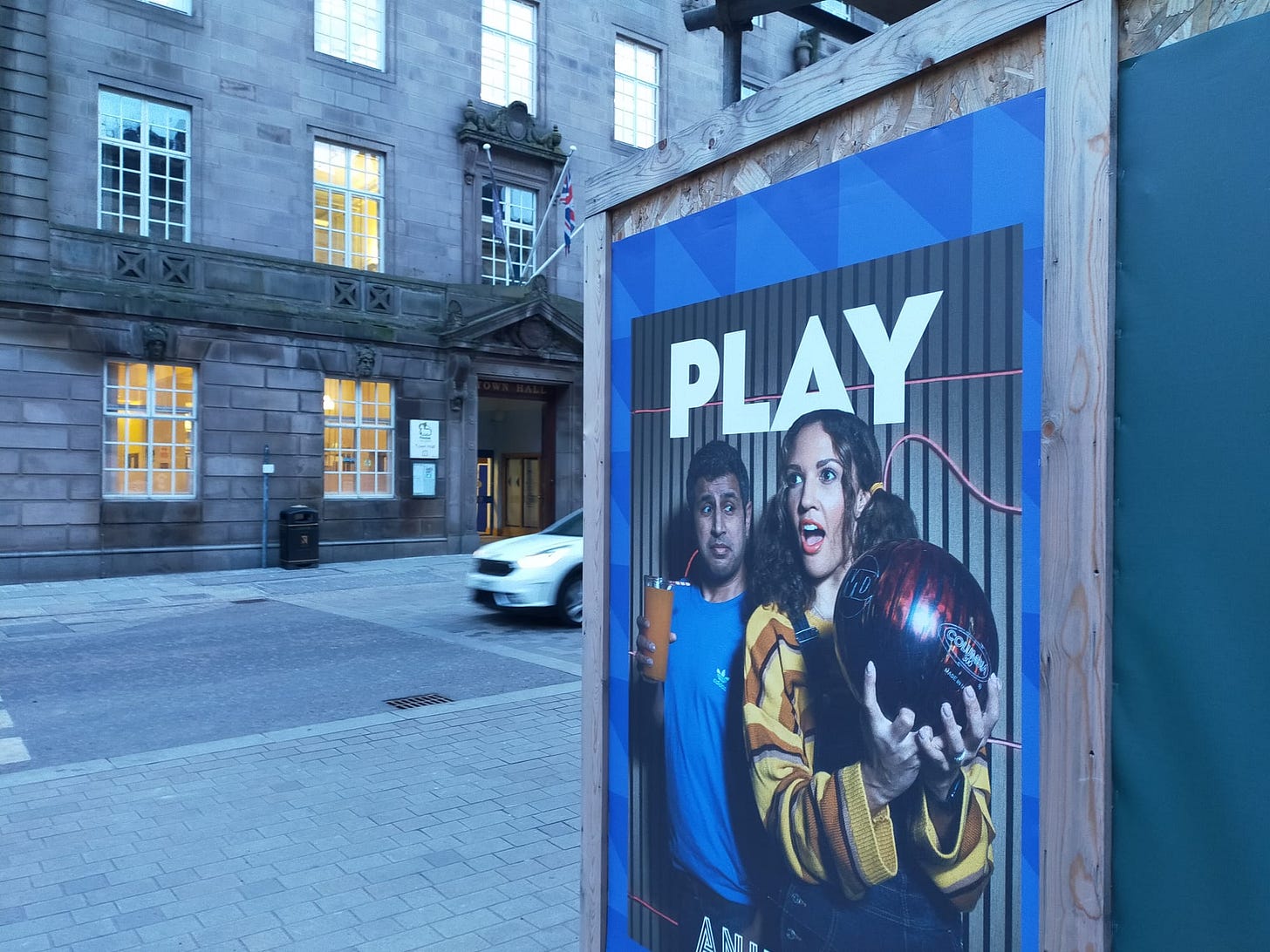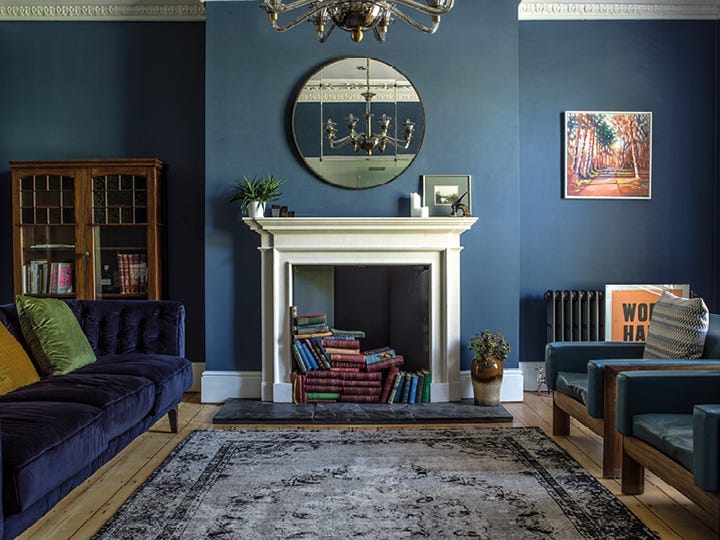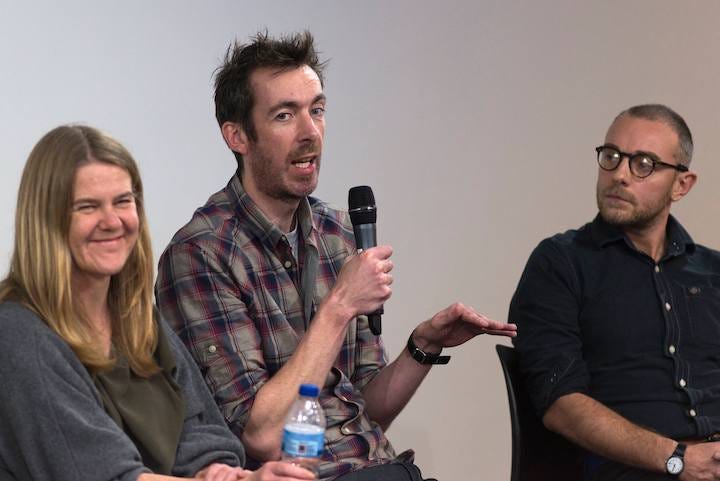Arts in the city that doesn't express itself creatively like a city
PLUS: Resignation after Lancashire Lead investigation
Hello and welcome to The Lancashire Lead.
Today we report in-depth on the news in January that Preston is the worst-funded city for creatives in England.
Berlew’s Creative Funding Report analysed Arts Council England funding to find out how much is spent annually per 10,000 residents. It also looked at funding available from councils for arts development and community events.
The news was met with frustration in some quarters and a knowing sigh in others, while Preston City Council figures who believe they are working hard to improve the city’s cultural offering bristled at the report.
Also in today’s issue comes the resignation of a councillor in East Lancashire after details brought to light by The Lancashire Lead. It’s not a short issue - but it’s a good one, so get a brew.
“It has this city status but it doesn’t really express itself like a city.
By Fergal Kinney
Andy Walmsley wanted to create, but he didn’t want to leave Preston.
“I’m a Preston lad,” says Walmsley, reflecting on the late 1980s and 1990s when he began his career as a graphic designer. “I want to stay at home, I like living where I live.”
There were opportunities in other cities, but why not try and make a success of it on your own doorstep?
“To be honest, I found it intimidating anyway because I wasn’t from that world,” he reflects. “So I decided, that if I was going to do it, I’d do it myself and we’d be the best studio in Lancashire.”
In 2003, Walmsley set up Wash Studios, a creative agency led by Walmsley, and managing director Lynsey Thompson, that works across film, brand and design.
“Before COVID, we’d done two car commercials, for Hyundai and Jaguar,” he points out. “I don’t know of any studio that has done anything like that in Lancashire. We really grew the business, and wanted to get better, more creative, and prove we could be as good as the London agencies.”
Underlining this, Wash set up The Artistry House, a full-time base in a townhouse on Winckley Square which sublets out work space to like minded filmmakers, designers and The British Institute for Professional Photographers.
At the end of 2024, The Creative Funding Report - a new research model by the Nottinghamshire design studio Berlew - assessed the potential impact of Arts Council England (ACE) investment and available local council funding on the creative sector in twenty-four English cities, excluding London.
Its outcome? That Preston is the worst funded city for creatives in England.
While Manchester benefits from £523,337 from the Arts Council per 10,000 residents, Preston is placed at the bottom with £24,250 spend per that same number.
That equates to less than 5% of Manchester’s funding, or a difference of £2 rather than £52.
By the report’s second metric, Preston also came second bottom in the list of lowest places for council funding of small and medium sized business-led arts and community initiatives, with the study finding £1,500 as the maximum on offer for arts and cultural organisations.
Of course, people in Preston are creating things and starting grassroots cultural programmes. So what is going wrong?
“Preston is a funny one,” says Ed Matthews-Gentle, a Senior Project Leader at Lancashire County Council and Programme Leader of Creative Lancashire. “It has this city status but it doesn’t really express itself like a city. It doesn’t express itself like a campus city in the same way that universities around Manchester have that energy from younger people.”
Young people, Matthews-Gentle argues, is a good place to start here.
“Lancashire and Preston have a big issue around retaining young creative talent. A big part of that is obviously dynamic. Lancashire’s towns and cities, their proximity to what you might call super clusters of creative industries.”
Or, put another way, Manchester is a short train ride away. This is starting to come to the attention of local leaders.
“The thinking around this is changing, about how culture and creativity attracts people to live, to invest and retain people”.
When Sally Lofthouse returned to Preston, it was not really her first choice. Lofthouse was born and raised in Ribchester, and studied architecture at the University of Nottingham and the Manchester School of Architecture.
“I didn’t really want to at first,” she says, “but actually Preston is such a nice scale to work at.”
Lofthouse started working for Preston’s North West Design Collective, a proudly northern, proudly feminist architecture practice set up by Jill Cowgill in 2019. During Covid , she helped instigate the SHOP community space on Syke Street.
“It was surplus to requirements space,” she says of a site that was previously a charity shop. “We put on an exhibition there and it just snowballed.”
What SHOP became was an ad-hoc creative space - Lofthouse likes the term “Preston’s spare room” - open to the community, which means anyone who fills in the Google form and pays the very small admin fee.
“We’ve had countless art exhibitions, workshops, people cooking curries, DJ sets, yoga classes.”
Lofthouse is proud of what the SHOP community have achieved, which is something that undoubtedly makes Preston a better place to live and work, but is frustrated by the lack of outreach from Preston City Council. She jokes that they only speak to SHOP to tell them off for putting up posters.
“We’ve not had any contact from anyone other than that,” she explains. “In terms of funding, or even acknowledgement that we exist, there’s nothing. We’ve been invited to speak about SHOP at private forums, but never anything council led.”
Lofthouse says that plenty of artists in her circle are looking for studio space.
Neighbouring Blackburn with Darwen Council has been successful in liaising with art groups to offer cheap empty buildings as studio spaces, leading to successes like the town’s Prism Gallery.
“We see all these empty shops on the high street,” she says, “and we just want to see buildings back in use.”
Arts infrastructure is another key problem. Preston Guild Hall has been closed since 2019, with reopening delayed by still-unresolved RAAC concrete issues. Preston’s Harris Museum has been closed since 2021 while a welcome £16m renovation has taken place. Cumulatively, this amounts to a lost decade for culture in Preston, slowing progress on an obvious level and creating lower expectations for locals on a wider level.
“The biggest problem is that there are no accessible venues for touring or local performers,” says Garry Cook, a photographer who operates in Preston. “People are disappointed (about the Creative Funding Report) but not surprised. Engagement with audiences is really low in Preston compared to the rest of Lancashire and the North of England.”
Blackburn, Burnley, Lancaster and other neighbouring towns all have between two and five working theatre spaces. “Preston has one.”
Cook helps organise Lancashire Fringe Festival in Preston, which did receive Arts Council Funding for its autumn 2024 edition, but says that it is a challenge to engage audiences.
“It’s almost become a generational thing,” suggests Cook, “where people have got out of the habit of live performances in Preston.”
Of course, there is Preston’s grassroots venue The Ferret, a 200 capacity space operating on Fylde Road, but a city of Preston’s size should be able to sustain a broader, commercial live performance offer.
“It’s created a social culture where people don’t do things here because they don’t expect it to be here,” says Jonny Cosmo, a poet and cultural strategist who speaks with audible enthusiasm about his home city’s creative potential.
“They’re going north, east, south, west but not here. As someone born and bred in Preston who creates, I’m aware of a lot of people trying to make things work. But there’s often no recognition of that, there’s very little funding and I think it’s an infrastructural issue.”
Cosmo became active in the campaign to restore the former home of the city's most famous suffragette Edith Rigby and turn it into a museum. The campaign was reported on by the BBC, but was largely left alone by local authorities. Some of this makes sense, museums are not cheap, but an assertive creative strategy could welcome and absorb the Edith Rigby campaign as part of the story Preston tells about itself. “There’s empty buildings, but we need business plans and ideas for the empty buildings,” says Cosmo.
Cosmo also bemoans the lack of support with arts council applications. “Comparing us to other cities, there’s not much support for bid writing,” he points out, “whilst other cities have a designated officer.”
In my conversations for this article, it is clear that people are not being given the support to navigate the complex world of funding applications. A culture of self-reliance is admirable, but is clearly leading to Preston not claiming its fair share of cash.
“Preston needs to step up a little bit in terms of meeting that challenge,” says Matthews-Gentle, “it has a job to do for the county. As a county, Preston has never really prioritised culture.”
I ask for clarification about who he means with this.
“I work in strategy for the county council and we have this weird two-tier system. In terms of what kind of stuff is important to the council, and probably my own council, we don’t prioritise culture and creativity and the arts, and we don’t make assets out of it as part of that infrastructure to support growth.”
This matters. Britain’s economy is often strikingly different to how people perceive it, and nowhere is this more the case than in arts funding. Heavy industry or agriculture are easy to understand, but often politicians at a local level struggle to see gaming, music, design or tech as the growth drivers that they clearly are. Arts is one thing that Britain excels at, with enormous benefits on a local level not just to growth but happiness and wellbeing, as well as retention of skills. Preston could have a good story to tell to cultural workers, with its strong transport links to Manchester and London. But for the people operating in the city’s creative industries, Preston is seemingly not ready to tell that story.
“We just need some guidance,” says Walmsley. “There’s people trying to galvanise stuff, but compared to any other university city, we’re thin on the ground. But Liverpool and Manchester get £50 a head and we get less than half of that. Now, I’m not from that world and I don’t know how it’s divvied up. But it needs galvanising.”
Anna Hindle, Preston City Council’s Cabinet Member for Culture and Arts, says the figures may result in positive change.
“We’re not sure how they came about those figures,” says Anna, “it has caused a debate that article, and if that helps generate more investment then that’s brilliant.”
Hindle points to Soundskills, a Ribbleton community centre who offer music and crafts clubs, who she has been supporting with funding applications. “We’ve been talking about setting up a stakeholder group too,” says Hindle, who says she has had recent successes engaging stakeholders in Preston’s night time economy on safety for women and wants to use those contacts to help “come up with a cultural strategy.”
Once the next budget comes through in May, Hindle says, “we can start with a fresh footing.”
Preston’s Labour Party Facebook page was more bullish around the time the study was published, stating that any Arts Council funding Preston does receive is thanks to their policies as ruling party of Preston City Council.
They also pointed to a number of projects that had varying levels of involvement from the council, including Encounter Festival, Radio 2 in the Park - the BBC event - and this week’s new food and cinema complex Animate.
We’re delighted to say Cosy Homes in Lancashire is supporting independent, in-depth journalism in Lancashire by sponsoring The Blackpool Lead and The Lancashire Lead. Discover how they can help you improve energy efficiency in your home and keep it warmer.
Councillor resigns after investigations reveals significant tax arrears
By Luke Beardsworth, Robbie Macdonald & Jamie Lopez
A Pendle councillor has resigned after revelations brought by The Lancashire Lead that he owed thousands of pounds in council tax and had missed many meetings.
Tom Ormerod was a Conservative councillor for Colne's Vivary Bridge ward until his resignation, which was announced this week by Pendle Council in an email to other councillors.
We had revealed that Tom Ormerod owed £3,835 in unpaid council tax to Pendle Council across three years. Further details from Cllr David Whipp said he had attended just three council meetings since being elected in May 2023.
Cllr David Whipp, Pendle Liberal Democrat Leader who had credited the Lancashire Lead investigation that brought the details to light, told us: "The Conservatives have covered up and apologised for one of their Councillors for far too long. This is the 4th resignation of Conservative Councillors in Vivary Bridge Ward since 2021. It's time that residents had responsible representatives looking after their interests.
“The Conservatives' vetting of candidates is a disgrace; they need to sort themselves out.”
Yesterday, Paul Preston, Pendle Council's democratic services manager, sent an email to councillors, seen by the Local Democracy Reporting Service, which states: "Tom Ormerod has resigned as a councillor on Pendle Council with immediate effect."
Mr Ormerod and Pendle Council's Conservative group have been contacted for comment. No comments have been received so far.
The Vivary Bridge ward in Colne already has one by-election due following the resignation of another Pendle Conservative councillor - Kieran McGladdery - after he claimed his group failed to back stronger taxi-safety measures at a council meeting in December.
Now with Tom Ormerod's resignation, a second by-election is expected but a date has yet to be confirmed. Pendle Council has been asked for further comment.
Thank you for reading and we’ll speak to you again soon.
Luke, Ed, Jamie, Sophie and the team.








